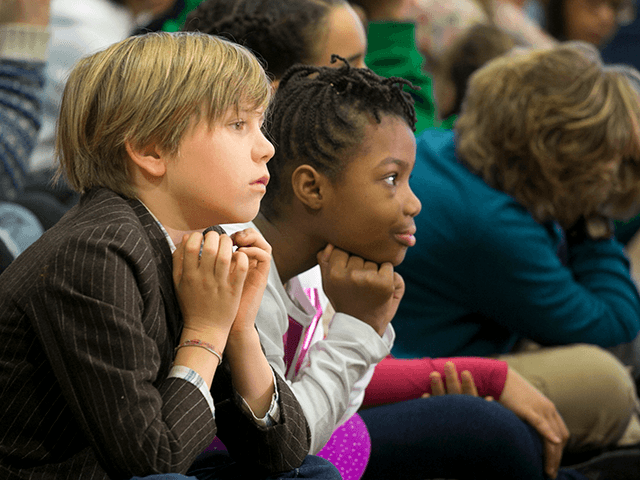Faculty members of the School of Education at Loyola University Maryland argued recently that while there are many topics that should be kept at the collegiate level because they are too advanced or inappropriate for children, Critical Race Theory (CRT) is not among them.
In an essay published at the Jesuit-led Loyola website, at the start of the academic year, Benjamin Parker, Ph.D., Christine Mahady, Ed.D., and David Marcovitz, Ph.D., did not bother to participate in the many denials by K-12 school administrators and teachers’ union bosses that CRT is being taught in their districts.
As an admin for the largest school district in Indiana, here's what we mean when we tell you that we aren't "teaching" Critical Race Theory: pic.twitter.com/f6RLghcw2R
— Tony Kinnett (@TheTonus) November 4, 2021
Instead, the Loyola faculty members praised the widely discredited “1619 Project” as a “landmark work” and “educative tool to be used to initiate honest and representative discussions in schools of the enduring legacy of slavery.”
The academics criticized the firestorm about CRT created by parents and concerned citizens in many K-12 districts:
For too long K-12 schools have been overly deferential in their approach to teaching anything that could be perceived as sensitive, political, or controversial. The result of this “neutral” stance is a large population of students that have never engaged in thoughtful or critical discussions about the role that race plays in society and the intersections of identity, place, power, and opportunity. Those discussions should not be limited only to college-bound students. There are plenty of topics that are reserved for the collegiate level and have difficulty translating to K-12 schools because they are too specific, advanced, or inappropriate for children. However, CRT does not fit those criteria.
No Critical Race Theory in Schools? Here's the Abundant Evidence Saying Otherwise | RealClearInvestigations https://t.co/GE0MbYJqEz
— Benjamin Weingarten (@bhweingarten) December 23, 2021
As John Murawski observed Tuesday at RealClearInvestigations, the essay’s authors praised Marvin Lynn of Portland State University’s College of Education as a “renowned Education and CRT scholar.”
Murawski wrote that Lynn agreed:
… conservatives are correct that CRT can be found in K-12 schools, but they exaggerate its influence because they assume every critique of systemic racism, structures of oppression and whiteness comes from CRT, when many scholars and activists who have never studied CRT use this terminology.
“Before we were even a nation, we were a slave state,” Lynn said, according to Murawski. “If that is your culture, if that is the way you were raised up, why would you think there’s anything wrong with suppressing and oppressing people based on their race?”
“If we haven’t done anything to undo that culture of oppression, why would white people be any different in terms of their thinking about black people today?” Lynn reportedly asked.
TakeCharge, a black-led movement challenging Critical Race Theory (CRT) and woke culture, released data this week that obstructs the “racial disparities” narrative CRT proponents use to justify their agenda. https://t.co/6SeoUMxcbO
— Breitbart News (@BreitbartNews) May 23, 2021
“The recent political attacks on CRT are dangerous,” the Loyola faculty members continued, “and are predicated on the power of misinformation and misrepresentation.”
They dismissed the concerns, vehemently expressed by many parents and activists who have condemned the revisionist history that teaches that, from its founding, America has been a racist nation, as simply political.
“[T]hese attempts to delegitimize decades of rigorous scholarship aimed at making our nation more just, equitable, representative, and conscious through examinations of laws, policies, and practices are by no means innocuous,” they wrote. “Fanning the flames of a ‘culture war,’ some politicians and media outlets are pitting CRT against ‘American’ values, history, and exceptionalism.”
So Democrats want American parents to believe that racist Critical Race Theory (CRT) is not taught in most schools, but their pals at the radical Teacher's Unions are going to court to fight laws banning the teaching of CRT? https://t.co/I95MUsh4hh
— Breitbart News (@BreitbartNews) July 11, 2021
The academics accused the numerous “school board members, politicians, faith leaders, parents, and citizens at-large” who are battling the teaching of the tenets of CRT of “stoking the fears of equity by insisting it is cloaking something insidious.”
“Every teacher, educational leader, and stakeholder that has been trained using CRT and witnessed the reality of it in the schools where they work or live must use their voice to resist this dangerous swell of divisiveness,” they argued.
“[A]s an institution of higher education, first we want to publicly express our commitment to CRT and anti-racist education, making it known that we will continue to prepare future educators using these methods,” the Loyola academics vowed.

COMMENTS
Please let us know if you're having issues with commenting.